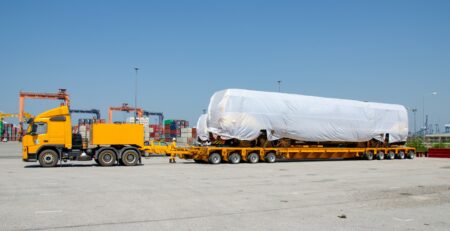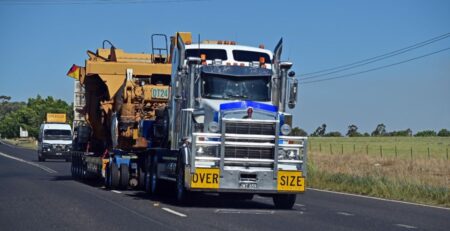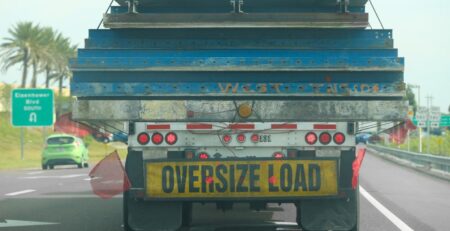You need to be efficient, comply with regulations, and ensure safety to drive your large trucks to transport oversized loads. And if you find it hard to do so, a pilot car will be a great choice. Moreover, if you’ve chosen a career in the trucking industry and want to take advantage of this opportunity, this article also discusses it. It will guide you on how to take advantage of trucking opportunities. Also, it will guide you on how to start a trucking business. So, have a look at the following content and resolve all of your queries about the pilot car and trucking industry.
What Is a Pilot Car?
A pilot car is also called an escort or lead car. It travels in front or behind an oversized load to guide it and ensure safety. Trucks that carry oversized loads, such as wind turbine blades, mobile homes, and construction equipment, are guided by pilot cars. There are different types of pilot cars, like lead cars, chase cars, flag cars and pole cars. So, use the one you find suitable.
Why Use Pilot Car to Escort Big Trucks?
A pilot car comes with multiple benefits. All of these advantages are mentioned below:
- Safety Enhancement: The main purpose of a pilot car is to ensure safety. It becomes hard for a truck driver to properly see the behind traffic when transporting oversized loads, such as wide machinery or long trailers. A pilot car not only informs the truck driver about the behind traffic but it also alerts other drivers on the road about the presence of the oversized load.
- Traffic Management: It’s hard to travel through congested roads and busy intersections if you have oversized loads. In case there is lots of traffic, an unexpected incident can happen. Considering all these factors, a pilot car guides the truck driver about the wide road to keep him traveling from congested roads.
- Route Planning: Multiple factors need to be considered while planning routes for oversized loads, such as road conditions, bridge heights, weight restrictions, and clearance requirements. The pilot cars arePilot are equipped with the knowledge and experience to assess routes beforehand and identify potential obstacles or hazards.
- Regulatory Compliance: Transporting oversized loads requires following the strict regulations and guidelines imposed by the authorities. From obtaining necessary permits to displaying warning signs and complying with escort vehicle requirements, pilot car drivers help navigate the complexities of legal obligations
Do you want to hire pilot car services and are looking for reliable sources? Then, nothing is comparable with 365Pilot. It offers high quality services at affordable prices.
How to Use a Pilot Car?
Don’t you know how to use pilot car services? If that’s the case, simply go through the following content:
- Research Online: Start researching pilot car services in your area online. To search online, enter the keyword “pilot car services near me.” Note down each service and its features.
- Evaluate Each Pilot Car Service: Once you’ve listed some pilot car services, it’s time to figure out the best pilot car services from all the services that you listed. Analyze the feedback rating and features of each pilot car service and choose those that you find suitable.
- Go for the Quote: In this step, you’ll ask for the quote from services that you sorted out. Once you receive a quote, opt for the pilot car service that offers exceptional features at affordable prices.
How to Activate Your Path to Trucking Opportunities
The following content will guide you on how to avail yourself of trucking opportunities in your area.
Make Your Resume
Your resume is the first expression. So, it must be exceptional. It would be a super good approach if you make a resume after getting tips from an expert. Follow the following tips to make an exceptional resume:
- Resume Format: Choose a resume format that properly showcases your experiences, skills, and education in a brief manner. There are three types of resume formats: chronological, functional, and combination resume format.
- Contact Information: Your contact information must be properly displayed so the hiring person can connect you easily. Make sure to add your full name, contact number, email address, state or city ZIP code, portfolio, or website link.
- Resume Summary: Add a berief but relevant summary in your resume. Ensure to briefly describe your skill in the summary to make it catchy and clear.
- Relevant Certificates: It will be a grabbing approach if you add an extra section for relevant certificates. Mention the certificate title, agency name from where you got the certificate, and expiration date of your certificate.
- Proofreading: Once you’ve completed your resume, it’s time for proofreading. Make sure to check grammatical errors and formatting typos. Properly check the resume to avoid any type of mistake. After proofreading your resume, ask an expert to check it and share feedback. If the expert asks to edit the resume, make changes if you find it suitable. Otherwise, ignore the suggestions and get your resume to submit for jobs.
Utilize Online Resources
Using online resources to get a job in the trucking industry proves a great approach. For example, everyone is available on social media. You just need to join the groups where trucking opportunities are offered and apply for these jobs.
LinkedIn is also a great network to get a trucking job. It also helps you contact professionals in your field to share your views and get tips. All you need to do on LinkedIn is start building your personal branding and applying for jobs. Make sure to apply for those jobs that match your experience level and skill set.
To build personal branding on LinkedIn, start posting regularly about your field. This will showcase to your potential clients that you have sound knowledge of your industry. As a result, they will hire you for your potential projects.
Strong Networking
You need to network with people from the trucking industry to get an opportunity for a trucking career. You can do so in different ways, such as:
- Using the job platform: There are multiple job platforms available. It’s recommended that you use all of them. You can use Trucker Path, and Company websites and apply for trucking opportunities.
- Trucking schools & events: Attend trucking school career fairs and industry events to connect with potential employers.
- Word-of-mouth system: Don’t underestimate the power of personal connections. Let your friends, family, and former employers know you’re looking for trucking opportunities.
Interview Preparation
Appear in the interview in neat clean and professional dress. To impress the interviewer, you need to follow the tips mentioned below:
- Research & Be Prepared: Study the company you’re interviewing with. Afterward, prepare a few questions related to their services.
- Be on the Time: Make sure to reach for the interview on the fixed timeline. If you reach for the interview on a fixed timeline, this approach will show how professional you are.
- Ask Questions: Show genuine interest by asking thoughtful questions about the company, the position, and the trucking industry overall.
Spotlight Your Unique Selling Point (USP)
Before going for the interview, figure out your unique selling point. For example, what sets you apart from other applicants? Are you multilingual? Do you have experience in doing jobs with hazardous materials?. Whatever your USP is, make sure to discuss it with your interviewer.
Remember: Getting your foot in the door of the trucking industry takes effort and proactiveness. By following these tips, you’ll be well on your way to securing your dream trucking job and hitting the open road with confidence.
Conclusion
There are multiple benefits in the trucking industry. So, if you have made up your mind to start your career in this field but don’t know how to grab the opportunities, this article will greatly help you. So, simply go through this article and avail yourself of trucking opportunities to start a successful career in this field.
FAQs
Why should I consider a career in trucking?
Trucking offers stable employment, competitive pay, and the chance to travel across different places. It’s a vital industry that keeps goods moving across the country.
What qualifications do I need to start a career in trucking?
Typically, you need a commercial driver’s license (CDL), which you can obtain through training programs at trucking schools. You also need a clean driving record and sometimes undergo a background check.
How do I get my commercial driver’s license (CDL)?
To get your CDL, you’ll need to pass a written knowledge test and a skills test, which involves driving a commercial vehicle. You can prepare for these tests through CDL training programs offered by trucking schools.
Where can I find trucking job opportunities?
You can find job opportunities through online job boards, trucking company websites, or by attending job fairs specifically for the trucking industry.
What types of trucking jobs are available?
There are various types of trucking jobs, including long-haul trucking, regional trucking, and local delivery. You can also specialize in specific types of cargo, such as refrigerated goods, hazardous materials, or oversized loads.










